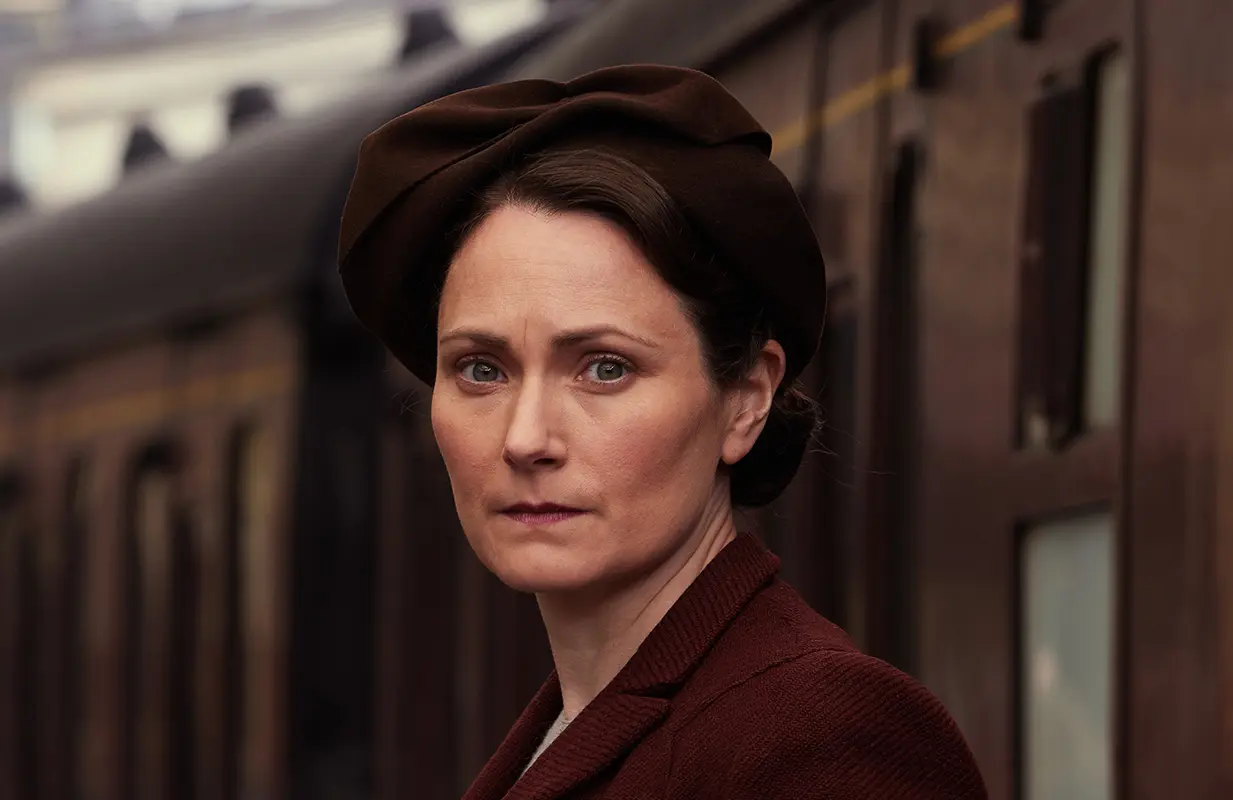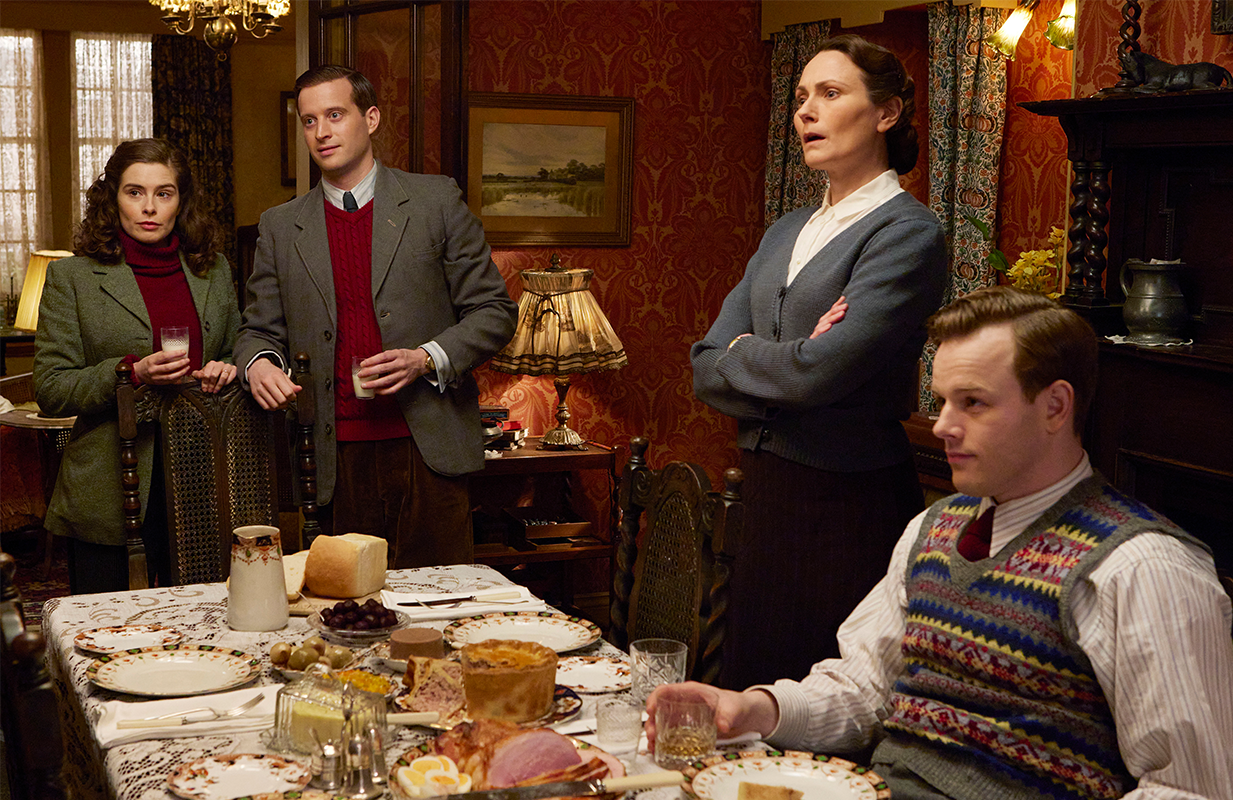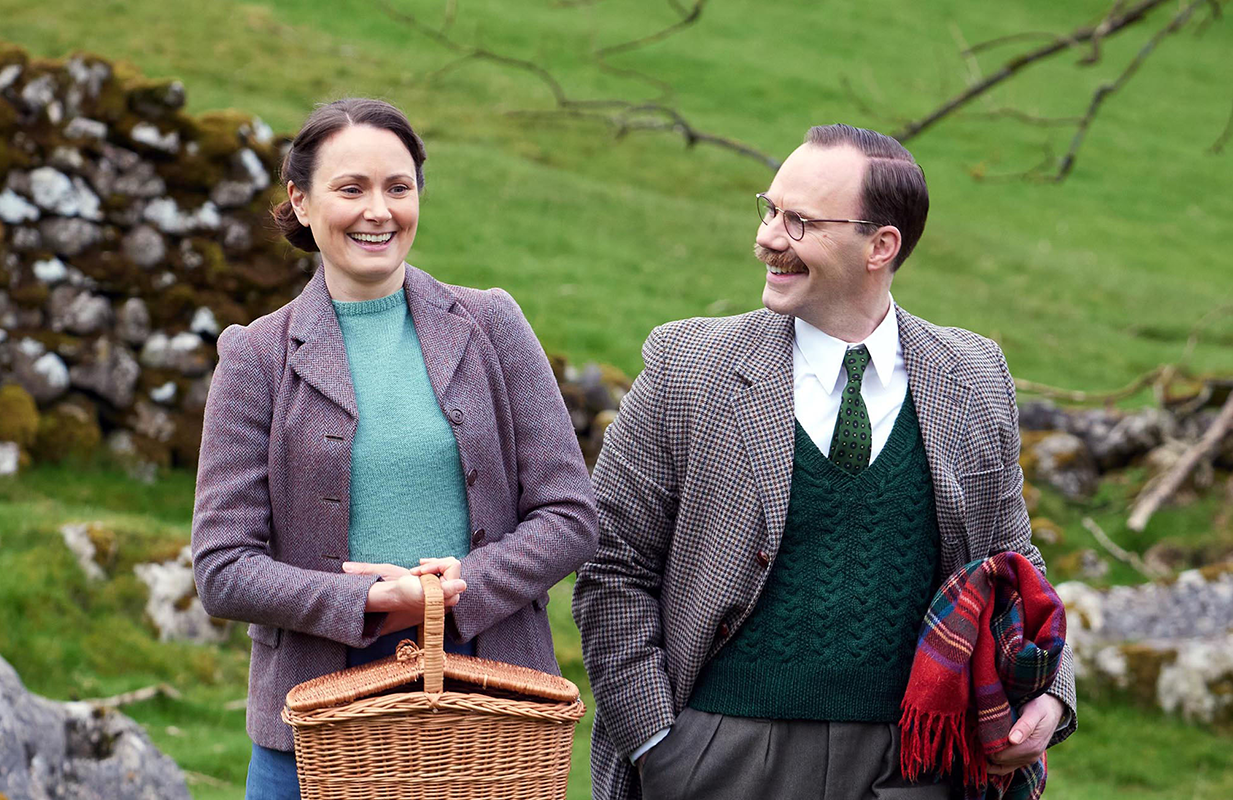All Creatures' Anna Madeley on a Potential Mrs. Hall-Siegfried Romance: 'It's Divisive Stuff'
-
 Anna Madeley in All Creatures Great and Small (Courtesy of Playground Entertainment and Masterpiece)
Anna Madeley in All Creatures Great and Small (Courtesy of Playground Entertainment and Masterpiece)[Editor’s Note: This interview contains spoilers for All Creatures Great and Small Season 3, Episode 5, “Edward.”]
For three seasons, All Creatures Great and Small’s Mrs. Audrey Hall, played by Anna Madeley, has been the heart and soul of Skeldale House, a force for stability amid Siegfried (Samuel West) and Tristan’s (Callum Woodhouse) brotherly quarrels and James’s (Nicholas Ralph) unbridled idealism. Early on, the show revealed Audrey is estranged from her son, whom she turned in for stealing from her previous employer, but despite their difficult relationship, Audrey holds out hope that he will write or, better yet, accept her invitation to come to the Yorkshire Dales for Christmas.
This finally comes to pass in Season 3, Episode 5, “Edward,” in which Audrey ventures beyond Darrowby to meet her son, shortly before he ships out on naval duty. With World War II looming, Edward (Conor Deane) believes his mother deserves a proper goodbye, but while their conversation does offer each a bit of closure, it also re-opens old wounds. All Creatures is often considered TV’s nicest show, but watching Audrey and Edward work through years of pent-up grief is decidedly uncomfortable, and their meeting makes for some of the rawest moments in the drama’s three-season run — not to mention Madeley’s finest work to date.
Primetimer sat down with Madeley to discuss the emotional episode, working with Deaf actor Lara Steward, a potential Audrey-Siegfried romance, and more.
After years of alluding to Audrey’s son, we finally meet him in Episode 5, “Edward.” What was your reaction to learning that viewers would finally be introduced to someone so important to Audrey’s character, her past, and her sense of self?
We were really excited about it. The idea of meeting Edward had come in and gone out — when’s the right time for it to happen? A lot of thought had gone into when that should be. You don’t want to rush something. You don’t want to not give it time to bear fruit. I thought it was really lovely that they waited this long. [Executive producer] Ben Vanstone, with Karim Khan, who wrote that particular episode, because they’d waited and they’d given it all those layers, it was a really beautiful piece of writing when I came along.
Everyone was really excited to finally meet Edward, partly out of curiosity, but also they see Mrs. Hall yearning for him for so long. It felt like the right time to say, “Okay, now this meeting should happen.” And it sat well in terms of it being a blessing and a curse that there was the prospect of war. Who’s to say it wouldn’t have been another year? It happened because he was suddenly confronted with, as everyone is at some point in the series, with who matters and what matters, and if I have to go away, who do I wish I’d spoken to or said goodbye to or told I loved, all of that. All of those things are in the mix. So it was a bit of a hurrah moment to finally have it arrive.
Your scenes with Conor Deane are so emotional, but also uncomfortable, with moments of real awkwardness. Did you and Conor discuss how to best navigate this space between familiarity and unease?
Interestingly, Andy Hay, who directed the episode, wanted us to stay apart. Because I had not met Conor before, and of course, instinctively, I’d love to meet him and have a beer with him and, as an actor, to welcome him in. But yeah, it was interesting. Andy said, “Can you not do that? Can you keep separate so we can have that sense of detachment?” Even though [the characters] know each other, obviously, but how has it been over the last few years? Mrs. Hall has no real idea. He’s grown up a little bit, and he’s in naval uniform. So having that little bit of distance was really useful to start our journey.
And it was really fun to get stuck in. The script is so good. There are so many layers there. So both with the physicality of it and with the text, it was a lot of fun negotiating those moments. It’s not an easy route, and it’s not a straight line. And it doesn’t end with a neat, tidy bow, either. I love that about it. It’s got that mess, but at the core, you get what you need from it.
It’s fascinating watching them interrogate their relationship in real time. You get the sense that this is unfolding in a 30-minute period; that’s all Edward has. He has to go back. Maybe part of him wants to go back. Maybe he doesn’t really want to have this difficult conversation today.
Yeah, and I think with those conversations, understandably, he wants to have it out with her. He’s angry. But also — I thought it was really interesting and something Conor did brilliantly — sometimes he feels like a little boy and sometimes he’s a man. He doesn’t quite know where he is, and she’s having to negotiate that, as well. Sometimes he needs her to be a very comforting mum, and other times he’s really confronting her with the fact that she’s not perfect, and she hasn’t always made the right decisions as a parent. And he has to decide whether or not he’s still going to love her and forgive her for those things. It’s a real rite of passage for him that he’s going up and accepting his mum as a person, not just his mum.
“Edward” is the first time I can recall Audrey’s story being centered in an episode. Did this newfound responsibility change your approach to the character? What were you most eager to share with the audience?
First of all, it was really exciting to get that story written for Mrs. Hall. It was a complete privilege to have that. I remember it feeling very exciting and ever so slightly daunting, that you wanted to get it right. But in another way, it’s sort of what you do. Because there was a very concrete story, it was really fun to get stuck in and plot through where you were going to be at any one moment. What’s the emotional journey through this story? And doing that with Andy and with Conor, that’s the juice of the job, I love that.
Also I love the fact that the script doesn’t spell everything out for you, but it gives you, the actor, enough to play with in terms of telling you enough about the emotional history and story and needs of these two characters. They both have their moments where they get a bit snappy with one another. They both have moments where it’s uncomfortable or the power dynamic shifts between them. Because the writing was so good, that felt quite easy to play with.
In terms of what [I was most eager to share] — Mrs. Hall has always been the heart of that house and she’s a very community-minded person, and seeing her in the outside world and seeing her be the recipient of the kindness of Penny — Lara Steward’s Penny, the tea lady — I enjoyed that about it, as well. Here’s a woman who hasn’t got it all sorted. She’s just a normal person doing her thing. She’s one of many families at that train station having to say their goodbyes or just meeting.

The heart of All Creatures is people who are trying to do their best, that core of people. And here it is, again. Just that sense of her wanting to make her family dynamic okay is quite interesting compared to — real family, I think, can be harder than that strangely dysfunctional mini-duck family they have at Skeldale, because they have that slight detachment of not being related. So I just thought it was quite moving to see Mrs. Hall, that yearning she’s had, that here she is really trying to make that work and negotiate her way through that. And also — at the end she gets welcomed by the other family that she has, while you hope that she has made some amends with her actual family.
As you said, Penny, the volunteer at the train station played by Lara Steward, is a source of comfort for Audrey throughout the episode. What was it like working with Steward? Had you worked with a Deaf actor before?
No, I hadn’t. Andy, our director, had worked with Lara before, and I think it was Andy who introduced the idea that the character could be played by a Deaf actress. I loved that it turned what’s a disability into — she has an ability to communicate in a different way. She's a little bit like Mrs. Hall would have been at 23, 24. She’s helping out, she's community-minded. She’s got the kindness, the wherewithal, the headspace to notice somebody who might actually really need that cup of tea. And I think [her kindness is] really appreciated by Mrs. Hall because she has this skill to lip-read. They finally nudge their way to communicate with one another, which is very sweet, but then she’s able to give Mrs. Hall something at the end. There’s a bit of a gift at the end.
Both [Steward] and Janice Crossland Jones, who played the other tea lady, both actresses are Deaf, and they had their interpreters on set. It was a real eye-opener to realize how much of our communication we take for granted. But then how quickly we got used to it. Once you learn a few things, you just get on with the job. Rachel Shenton, who plays Helen, can sign, so we had an initial Zoom meeting where Rachel very kindly interpreted for us, and it was really amazing. Once we got used to the idea that you can’t just call somebody, you can’t just assume someone might have heard a bit of a conversation, then there was no barrier to it. It was great. You just get on with it and do the job.
The episode ends with a sweet moment between Audrey and Siegfried, in which he expresses how grateful he is to have her at Skeldale House. As I’m sure you’re aware, fans have very strong feelings about Audrey and Siegfried getting together. Do you think this could ever be a possibility? How do you think it might alter the dynamic in the practice?
It would alter it enormously. Oh god, it’s so hard. I honestly don’t know. If they did get together, I don’t think they would talk about it at all.
It’s a delicate weave of all the different layers of their relationship. But it’s a lot of fun, and it’s a question we’re always asking, about what crosses the line and what doesn’t, who has the power in any given moment. There are certain moments where it’s obviously him. He’s the boss, he pays her wages. But there are also times where it’s her. And that is one of the really fun things.
It’s interesting because there are people — I’ve heard people be for and against her and Siegfried. So it’s divisive stuff.
Looking ahead, do you think Audrey’s meeting with Edward — and her realization that she must confront the past in order to move forward — has opened her up to love, even just a bit?
I would hazard yes, I think it will. If you look at the full trajectory of it from Season 1, where you just hear that her husband has been a bit of a brute, she’s in this very lovely position of being quite independent as a single woman. Just having that space to be herself for a while is quite a lovely thing. A lot of people would probably say that if you come out of a relationship, it’s always the moment when you feel at one with yourself that you meet somebody, that you’re open to meeting somebody new, and I think that’s a little bit what’s happening with Mrs. Hall. She’s got two feet on the ground and she’s having a good time. But it’s so complicated: The divorce laws changed in 1937. Dorothy Atkinson’s character [Diana Brompton] that was in Season 2 was divorced, but it was rare, and a big deal.

Her conversation with Edward, when he starts to talk about how he doesn’t really know how his dad is, he’s seen his dad’s drinking in a new light and he’s decided to detach himself from that, I do think that allows Mrs. Hall a little bit more freedom. Because he’s able to grow up a little bit — he’s not a little boy who’s like, “You can’t leave my dad,” anymore. He’s a boy who can get it on another level now.
For anyone in that position, it’s hard, isn’t it? But particularly back then, it would’ve been really difficult. And the idea that it might cause any further problem with Edward, she wouldn’t want to dig into something that made things worse. Whereas if her relationship with Edward is good, and he’s accepting of her decision to leave his dad, that’s a huge emotional shift. There’s still a lot of logistical things, but emotionally, it definitely buys her some freedom.
While Audrey meets Edward, Tristan assumes her housekeeper responsibilities back at Skeldale House. Did you give Callum Woodhouse any advice about stepping into Audrey’s shoes in her absence?
I gave him no advice! But that’s what was great. We were in the train station and he was sending me photos of himself in my pinnies. I was like, “What are you doing in my kitchen creating a mess?!” And it was that fun of seeing someone else — the idea of trying to work your way around that kitchen with all the craziness and the weirdness of cooking on something. [It’s] an AGA, but it isn’t hot. You’ve got to act that it’s hot. All those little things that are going on as you’re trying to act your way through the scene. It was cruel of me, perhaps, but it was just really fun seeing him. He did it brilliantly though, and he was so sweet.
When Tristan serves those mashed potatoes at lunch and Siegfried begrudgingly admits they’re better than he would have thought — it’s the perfect distillation of their relationship.
I love that moment. And it’s great, as well, the Tristan who needs pats on the back, doesn’t he? The idea that he’s stepped up to something and he’s actually done well, and begrudgingly Siegfried has to admit it’s not that bad. I love that.
That storyline also serves as a lighthearted counterbalance to the emotional work you’re doing with Conor in the train station.
I love that storyline as well, with the little lad coming in to do work [and shadow Siegfried at the practice]. It taps back into your past, your history, that Tristan was perhaps this little boy who was really excited by doing these things and wanted to impress his big brother or his dad. It’s really moving. Because Mrs. Hall watches Tristan try so hard, and she watches Siegfried just not quite give Tristan the response he needs, even though he clearly adores Tristan and has done everything he knows how and what to do, which is sort of all you can ask. It’s also really lovely for Mrs. Hall to come home and know that they managed to hold down the fort and Tristan stepped up brilliantly. That’s a really lovely welcome home for her, even though the dog ate the biscuit, which was not rehearsed.
Really? I figured that was a new trick Jess had learned.
No, Jess just came in and went for half of it, so I broke a bit off for her, and then I tried carrying it with the tea and she said, “Oh, I’ll have the rest of it.” She did it brilliantly, as well, without spilling the tea.
There was another one of those where we had to shoot it quite quickly. It’s fun sometimes — we just roll with it and see what happens and you get a lovely magic moment, especially with the animals.
This interview has been edited for length and clarity.
All Creatures Great and Small airs Sundays at 9:00 PM ET on MASTERPIECE on PBS. Join the discussion about the show in our forums.
Claire Spellberg Lustig is the Senior Editor at Primetimer and a scholar of The View. Follow her on Twitter at @c_spellberg.
TOPICS: All Creatures Great and Small, PBS, Anna Madeley, Samuel West